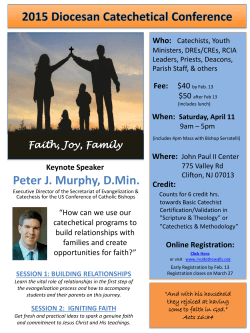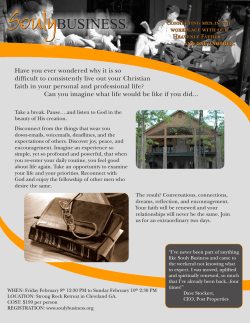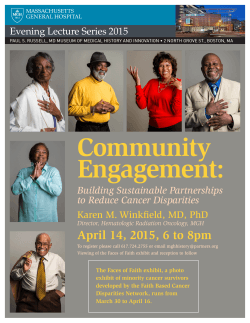
faith and civil liberties - Compass
FAITH AND CIVIL LIBERTIES M NEIL BROWN OST, IF NOT all, the New Atheists are fervently libertarian, perhaps libertarian even before being atheists, because historically they inherited a view of God as the great enemy of human liberty, an inheritance that came to them through Feuerbach, Marx, Nietzsche and Freud, as Michael Buckley shows: Sam Harris' statement that 'the very ideal of religious tolerance... is one of the principal forces driving towards the abyss.'6 Here tolerance is sliding into intolerance and rendering dialogue problematic. There is, of course, some justification behind this exceedingly unattractive portrayal of religion's do's and don'ts, which often do seem to be conjured out of the air. But before ceding too much ground, we should consider whether Harris' 'abyss' lies more in the hole dug by human freedom pushed to its limits as it is in anything else. There seems to be a logic of progression in the modern concept of freedom which steamrolls over anything that stands in its way. It begins with the 'pursuit of happiness' understood as an individual right, which then quickly, in turn, morphs into the satisfaction of individual wants, needs and pleasures - to which, of course, there can never be an end, except death or running out of material resources to satisfy the ever clamorous wants! Once on this treadmill, such a pursuit requires maximum individual liberty, understood as freedom from all restraint (reminiscent of adolescence), especially from the restrictions of religion, which put a dampener on the party by injudiciously introducing the topic of 'sin'. For Grayling, with tongue-in-cheek, the 'great sin' is harming others.7 The ideal then becomes self-assertion which is practically unlimited when adults consent to neutralise any idea of 'harm'. The desires, needs and pleasures involved can also be mass produced, manipulated, and chemically enhanced, as well as being given full scope as entrepreneurial freedom and market competition to change the fabric of society. It has created a very different world and a very different set of expectations about the meaning of life and our individual entitlements. Each of these formative thinkers argued that the human and the divine are antithetical, that God preys on the human, that one must die if the other is to live. Historically and psychologically, they are posed in ineluctable threat and hostility. The affirmation of one necessarily means the denial of the other. One can only choose between them.1 Dogma and absolutism are the marks of religion according to Richard Dawkins: for him the rational ideal is to be found in 'liberal, enlightened decent people' as against 'religious absolutists who advocate sanctity of life, oppose homosexuality, abortion and euthanasia, and seek to indoctrinate tiny children in the religion of their parents.' 2 While Sam Harris maintains: Faith drives a wedge between ethics and suffering. Where certain actions cause no suffering at all, religious dogmatists still maintain that they are evil and worthy of punishment...3 In this same vein, A.C. Grayling's manifesto embraces the gamut of love, sex, drugs, life and death: forbidding people to eat or drink what they wish, however silly or dangerous to themselves, or forbidding them to seek certain pleasures, however degraded, is a flagrant violation—a breathtaking one—of the privacy of the individual.4 Grayling labels religious views to the contrary as 'the superstitions of illiterate herdsmen living several thousand years ago'.5 When the debate is pitched in such opposing terms as 'enlightenment' and 'superstition', tolerance is stretched to breaking point, as is shown in 39 COMPASS Freedom thus understood is a heady mixture that pushes us to be always testing the limits of experience and gearing up to sensory overdrive. We seem surprised when self-assertion spills over into violence and aggression, and accept the inevitable increased surveillance and regulation this brings with it, just as we also accept the consequences of social and family bonds and lives unravelling, leaving more and more individuals in need of institutional and therapeutic support. The New Atheists assume that modern society should be governed by their liberal values and be entirely secular. This may be their goal, but in reality modern multicultural societies are much more complex than they suppose. While there are strong currents of thinking along those liberal lines in modern democracies, in fact such societies are pluralist and becoming increasingly so, where many widely divergent opinions, religious views, and lifestyles, live, sometimes uneasily, side by side, with the liberal view being only one among many, and all needing to work out how to cooperate to solve their common problems. The liberal view is not neutral ground in such societies, nor is it a minimum view acceptable to all. Divergent viewpoints espouse different values and principles, and have their own reasons for their positions, even while acknowledging they must live and work with others who do not share their views. People are not able to put their fundamental beliefs into cold storage simply to please liberals. There are in pluralist societies inescapably different views about the extent the common good should impinge on individual liberty, the degree to preserve equality in a society driven by entrepreneurial freedom, and the extent to which the market should be allowed to dictate to social life. What is needed in a pluralist society is not necessarily the libertarian viewpoint, but more fundamentally, a respect for each and every person's equal dignity and associated rights by other citizens and by government, Fr Neil Brown taught at the Catholic Institute of Sydney for thirty-four years, He is currently the Parish Priest of Bondi Beach in the Sydney Archdiocese. and a place where citizens have an equal voice in a process that involves respect for the law, democratic principles, due process, fair procedures and a willingness to compromise. As the philosopher, Nicholas Wolterstorff states: Given our disagreements, the equal right of all adult citizens to full political voice, within constitutional limits, on the scope of governmental authority and legal protections against the impairment of a citizen's right to full political voice by his fellow citizens, is as fair to all points of view as any arrangement could possibly be.8 Modern societies exhibit a cacophony of such voices—atheists, people of no religion, Christian groups alongside Moslem, Jewish, Hindu and Buddhist communities, many ethnic groups, political parties, special interest groups, commercial interests, and the power of mass media. Freedom will in principle need to be broad enough to accommodate such a range of views, but will also need to be gauged and articulated with a view to different views about freedom, justice, equality and the common good. One skirmish quickly follows another on this battleground—abortion, same sex marriage, euthanasia, both voluntary and involuntary, pornography, drug decriminalisation, public health issues, surrogacy, and the more things become technologically possible, the longer the list will become. We are now wrestling biological control of our own makeup from nature and altering the conditions of our lives in unheard of ways—how do we negotiate this trajectory? Core values, such as marriage, family, be40 FAITH AND CIVIL LIBERTIES liefs about the beginning and end of life, the common good, individual freedom, public and individual health, privacy, and equality, are at stake in these disputes about how far legislation should be allowed to intrude into citizens' lives. Often the religious institutions in these disputes come across as the enemies of individual freedom and public health, and so far they have chalked up a long string of losses. Obviously their arguments are not convincing the majority of their fellow citizens. Given the widely divergent views in modern pluralist societies, government cannot be about any particular conception of the 'good', but is rather concerned with the freedom of all its citizens to pursue their own conceptions of the 'good', provided that pursuit does not undermine society itself or harm others. Libertarians push this proviso as far as possible towards the maximum of individual liberty, while other groups may see society being weakened much before that extreme is reached. The challenge for such groups is to achieve a consensus about the harm being done. No easy task as can be seen by the spectacular failures in this regard to date. There are, however, a number of deeper issues involved in these disputes, which rarely surface, because each dispute remains tethered to the issue itself, without ever going deeper into what is at stake. Firstly, a quality of freedom is achievable only if it is harnessed and channelled so as to be able to achieve goals and enhance life and relationships. Such freedom is both a personal and social construct—it requires family nurture and social support if the right choices are to be made. It does not happen automatically— in fact, it will self-destruct if left to itself. It also requires the right kind of beliefs and values to motivate its achievement, which is the particular task of community groups, and to which task, of course, faith-based groups make an important contribution. Individual freedom in this deeper and wider sense depends on a fragile set of personal and social skills. Given the number of people, especially young people, who fall through the cracks of our highly individualistic society, it seems obvious that these skills are more and more at risk. Legislation may not be the best solution, but at least it can be argued that preventing these fragile skills being further weakened is a real need in many of these disputes. In any case, it is an argument for greater freedom, not against it. Secondly, growing inequality is just as toxic to individual freedom as any proposed change to legislation might be. As inequality increases some voices become louder, especially if they control modern media, and other voices are drowned out or fall silent entirely. From his study of three hundred years of wealth distribution, Thomas Piketty concludes: Today, in the second decade of the twenty-first century, inequalities of wealth that had supposedly disappeared are close to regaining or even surpassing their historical highs. The new global economy has brought with it both immense hopes (such as the eradication of poverty) and equally immense inequalities (some individuals are now as wealthy as entire countries).9 Inequality corrodes the skills required for individual freedom, imprisoning those it affects in a vicious cycle of voiceless poverty. The issue of equality broadens the debate about freedom beyond the narrow issues and introduces a note of social reality, which has long been a concern of the churches, particularly of the Catholic Church's social teaching. Thirdly, we live in a society where the scientific, technological and commercial viewpoints are dominant, and the personal, internal, relational viewpoint is increasingly sidelined. Values, beliefs, including religious beliefs, and individual freedom, all have their origin and are nurtured in strong relationships, which need to be protected from the inside, not just the outside. When everyone is seen simply in terms of numbers and statistics, public opinion polls, and commercial interests, the personal viewpoint and its need for healthy relationships is lost. As the 41 COMPASS philosopher, Roger Scruton, warns: 'By remaking human beings and their habitat as objects to consume rather than subjects to revere we invite the degradation of both.' 10 This personal viewpoint has both social and ecological consequences thus again placing the freedom debate in the wider context of what kind of society do we want to live in and how much do we want to preserve of our environment. A further question is what kind of people do we want to become? There is the danger that society is being remade along market lines—self-assertion, acquisitiveness, superficiality, competitiveness, and instant gratification, all characteristics of freedom in the narrow, individual sense of being free from all restraint. Lost in this mix are compassion, generosity, faithfulness, empathy and social responsibility, which are all marks of freedom in the more comprehensive sense of being enabled to fulfil life's goals. Fourthly, and this is more an internal matter for the churches, God is the freedom that makes our freedom in this wider sense possible—a fact that is lost if faith becomes saddled in the popular imagination with innumerable rules and prohibitions. We need to reclaim more of the original welcoming spirit of the gospels: 'And as he sat at dinner in Levi's house, many tax collectors and sinners were also sitting with Jesus and his disciples—for there were many who followed him.' (Mk 2:15); and also Paul's generous concept of freedom—'For freedom Christ has set us free' (Gal 5:1). For too long as Christians we have allowed ourselves to be caught up in single issues, without attending to the broader picture, where our basic stances are to be located. We need to be able to present a clear choice, as Timothy Keller shows: which account of the world has the most 'explanatory power' to make sense of what we see in the world and ourselves? We have a sense that we are very flawed and yet very great. We have a longing for love and beauty that nothing in this world can fulfil. We have a deep need to know meaning and purpose. Which world view best accounts for these things?11 Atheism has presented the choice of either God or human freedom. We need to show that is not the case. The choice is rather between a freedom that locks us within our own needs and wants or a freedom that allows us to reach our God-given potential as human beings. To do that effectively we need to reshape our mission and message. People's freedom in a pluralist society should only be curtailed for serious reasons to do with freedom itself. Arguments formulated in terms of a group's own particular views or doctrines will always fail. Sometimes non-intervention may be the right decision. If the Church decides that intervention is needed, its approach, therefore, needs to be in terms of its holistic view of freedom and humanity. Instead of being jarringly out of step, its message then may have a chance of winning over hearts and minds. NOTES 1. Denying and Disclosing God ( New Ha8. Understanding Liberal Democracy, ven: Yale University Press, 2004) 94. Terence Cuneo (ed) (Oxford: Oxford Univer2. The God Delusion ( Boston: Houghton sity Press, 2012) 132. Mifflin, 2006) 286-98; 339. 9. Capital in the Twenty-First Century, 3. The End of Faith (London: Simon and Arthur Goldhammer (trans) (Cambridge Schuster, 2006) 168-9. Mass.: Belknap Press, 2014) 471. 4. The God Argument (New York: 10. The Face of God (New York: Bloomsbury Bloomsbury, 2013) 215. Press, 2012) 178. 5. ibid., 135. 11. The Reason For God (London: 6. The End of Faith, 15. Hodderand Stoughton, 2008) 122. 7. The God Argument, 194. 42
© Copyright 2025

















